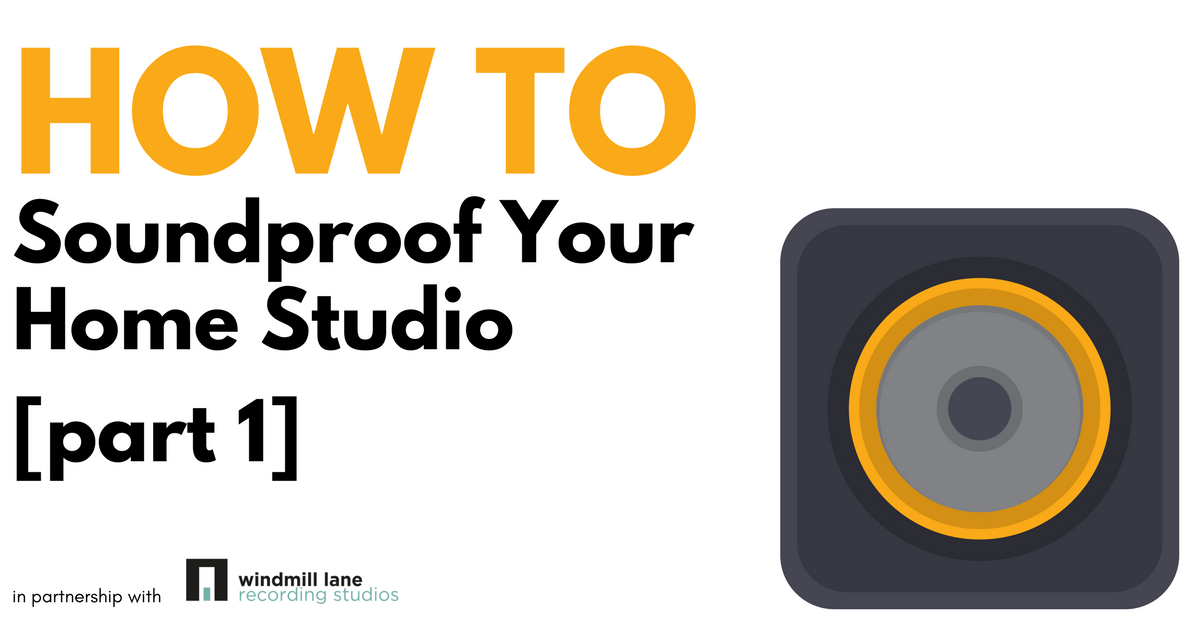
Content supplied by our Studio Partners Windmill Lane Recording Studios.
The first in a two-part series focusing on soundproofing techniques. In part one we’re going to look at how to keep unwanted sound escaping your studio.

Thinking of investing in a home studio but worried you might drive your family and neighbours nuts with the noise?? It might sound like sweet music to you but to your family and neighbours – it can be a major annoyance – we’ve all been at this crossroads at one stage or another!
If you’re seriously considering taking the plunge there’s a few techniques you can use to tackle the noise so everyone (pets included!) can live their lives normally. Adding soundproofing to your home studio is great help but there’s plenty of things you can do to reduce the noise level; check these out:
Picking A Room
Understanding how sound works is very important not just for sound proofing but it helps a lot if you are learning to become an excellent audio engineer. Different sounds have different wave patterns and some (very often bass frequencies) are more likely to travel causing a problem.
We might not all have the luxury of a wide choice of rooms at home to choose from, but if you have options, that choice it can make a difference.
So, what do you need to think about?
You’re never going to be able to stop all the sound so it’s more take the time to think things through. Try not place it beside someones bedroom and if you know which rooms your neighbours sleep in, keep that in mind too! If you have a garage off the side of the house, attached to the kitchen for example, it could be the perfect spot!
Doors & Windows
When you’re soundproofing imagine the sound is water. Water can seep through even the tiniest of cracks and so can sound. Doors and window are often a weak spot so give them extra attention.
First of all, let’s talk about doors.
Doors are often constructed from light wood and are hollow. If you feel like splashing some cash you could invest in a heavier door but if that’s not an option try and seal up any gaps at the bottom or sides of the door.
The same can be said for any gaps around windows. When picking a room with windows, try and find one with double glazing as they’re a big improvement on single glazing. Heavy blackout soundproof curtains and window film are two cheaper options and make a massive difference.
Oh! and remember keep the doors and windows shut during takes – you don’t want the whole neighbourhood hearing your drummer laying down a perfect take!
Tip: Keeping cool to be important for the musicians. Your home studio may get quite warm with a few bodies in it. Throw in the heat from guitar amps and your computer – you’ll be extra toasty! Open up the window and doors in between takes for some fresh air.
Walls & Floors
Walls and floors, if made of solid concrete are generally pretty good at keeping in the sound. But you can do a few things to make them even better.
For walls use acoustic panelling to help dampen the sound and trap it from escaping.
On your floor use some extra mats or rugs and also sound absorbers where possible.
Room Within a Room
The best solution is to build a room within a room, essentially a raised floor on top of the original along with a new wall and ceiling, but let’s be honest this isn’t going to be easy or cheap.
You could have a go at doing this DIY style and using Green Glue – a really good soundproofing compound. Basically, you have to pack it in between two panels. Use two sheets of plywood and build yourself a new floor and walls for your studio.
Take Your Time
As you can see there are lots of different ways to go about this and we should also mention that it’s well worth talking to the people most affected; maybe they are out at certain times of the day or they could tolerate a certain amount of time but not an eight hour session?
It’s worth investing to get this issue sorted and take your time – experiment to find out what works best for you (and them!).
Thanks for dropping by and don’t forget to check back soon for part 2 where we’ll be discussing ways to control the sound within your studio so you can produce better quality recordings.
PART 2
Click here to check out Part 2 of our ‘How To Soundproof Your Home Studio’ articles!
AUDIO AND MUSIC TECHNOLOGY COURSES AT PULSE COLLEGE
Find out more about our Audio and Music Technology programmes or Contact Us to discuss any of our other courses in more detail!
Click Here to find out about our next upcoming Open Event to visit the campus at Windmill Lane Recording Studios.
[openday]
FOLLOW US